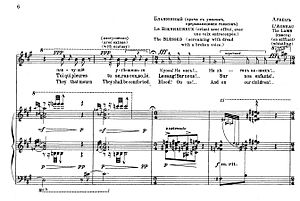Nikolai Obukhov
Nikolai Borisovich Obukhov was a modernist and mystic Russian composer, active mainly in France. An avantgarde figure who took as his point of departure the late music of Scriabin, he fled Russia along with his family after the Bolshevik Revolution, settling in Paris. His music is notable for its religious mysticism, its unusual notation, its use of an idiosyncratic 12tone chromatic language, and its pioneering use of electronic musical instruments in the era of their earliest development.
Obukhov was born in Olshanka, in Kursk Province, Russia, about 80160km southsoutheast of the city of Kursk. While still a child, his family moved to Moscow. They were attentive to his musical development, having him taught piano and violin from an early age. In 1911 he began studies at the Moscow Conservatory, and he continued at the Saint Petersburg Conservatory from 1913 to 1916, where his teachers included Maximilian Steinberg and Nikolai Tcherepnin. In 1913 Obukhov married Xenia Komarovskaya they had two sons before they left Russia.
Source: Wikipedia

